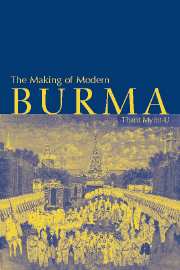Book contents
- Frontmatter
- Contents
- Acknowledgements
- Introduction: The fall of Mandalay
- 1 Kings and distant wars
- 2 The Irrawaddy valley in the early nineteenth century
- 3 The Court of Ava
- 4 Empire and identity
- 5 The grand reforms of King Mindon
- 6 Revolt and the coming of British rule
- 7 Reformists and royalists at the court of King Thibaw
- 8 War and occupation
- 9 A colonial society
- Conclusion: The making of modern Burma
- Bibliography
- Index
4 - Empire and identity
Published online by Cambridge University Press: 05 June 2012
- Frontmatter
- Contents
- Acknowledgements
- Introduction: The fall of Mandalay
- 1 Kings and distant wars
- 2 The Irrawaddy valley in the early nineteenth century
- 3 The Court of Ava
- 4 Empire and identity
- 5 The grand reforms of King Mindon
- 6 Revolt and the coming of British rule
- 7 Reformists and royalists at the court of King Thibaw
- 8 War and occupation
- 9 A colonial society
- Conclusion: The making of modern Burma
- Bibliography
- Index
Summary
Defeat had made the Court of Ava anxious for the future of the kingdom. Until the First Anglo-Burmese War, the men of the Golden City, buoyed by a generation of virtually unchecked military expansion, had entertained grand schemes for further conquest. Their home was the centre of an expanding empire, and their king a universal monarch, a chakravatti over many subject peoples. Within months their world had come crashing down. As the army of the East India Company sailed up the Irrawaddy, the extent of the new English threat became clear for the first time. The defeat, the annexations and the indemnity, the sudden awareness of their inferiority in science and technology, threw the Burmese ruling class into confusion. One of their first responses was to write a new book of history, the Hman-nan Raza-windaw-gyi, ‘The Glass Palace Chronicle’.
History and origins
In the summer of 1829, King Bagyidaw ordered that a new royal chronicle be composed. A committee of scholars – ‘learned Brahmins, learned monks and learned ministers’ – was assembled and began meeting in the front chamber of a small glass-mosaic-covered palace near the king's own private apartments. There they met every day for months, with their secretaries, reading decaying palm-leaf manuscripts and examining even older stone inscriptions. They drew heavily on a number of existing chronicles, scrutinising apparent contradictions, adding their own commentaries and cross-checking sources, and brought the narrative up to Bagyidaw's own coronation. Their stated desire was to analyse the many discrepancies between existing historical works and to arrive at a definitive interpretation. They wished to ‘adopt the truth in the light of reason and the traditional books’.
- Type
- Chapter
- Information
- The Making of Modern Burma , pp. 79 - 103Publisher: Cambridge University PressPrint publication year: 2001



